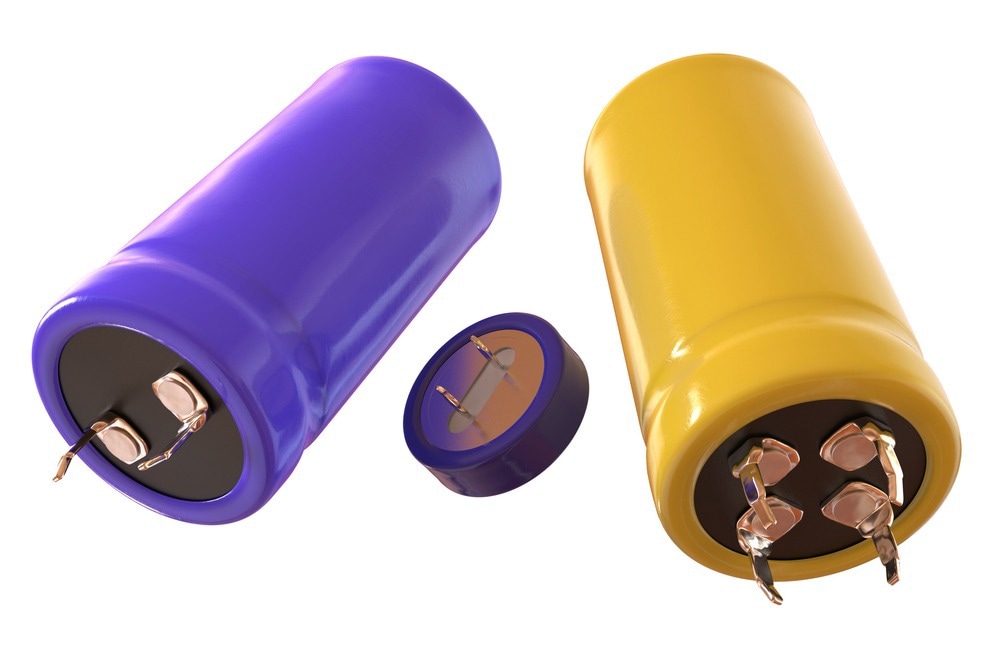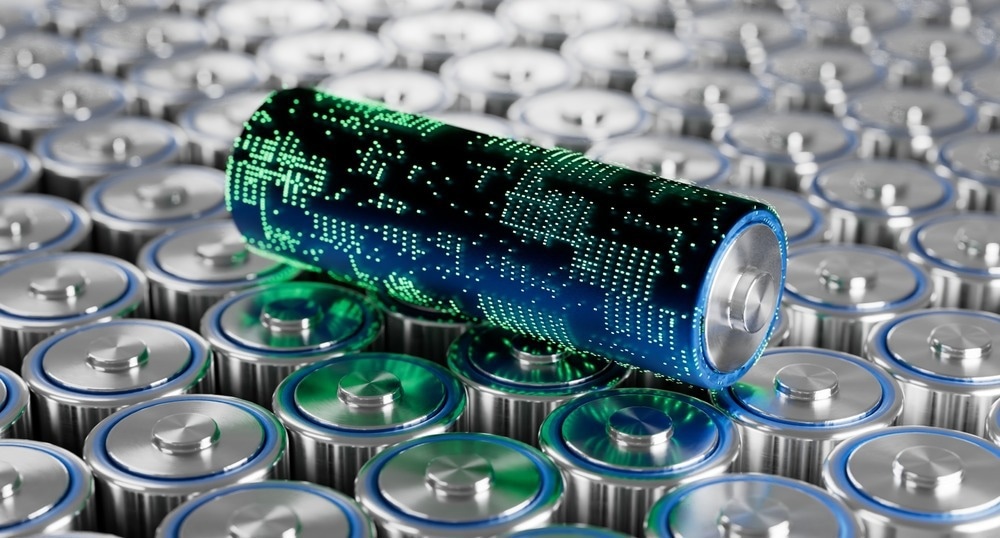In pursuing cleaner, efficient, and sustainable energy storage solutions, supercapacitors and batteries have emerged as promising technologies. This article will explore the properties of supercapacitors and batteries, their applications, environmental impacts, and the commercial landscape to understand their roles in the future of energy storage.

Image Credit: Peter Sobolev/Shutterstock.com
Supercapacitors vs Batteries: An Introduction
Batteries consist of electrodes immersed in an electrolyte, where a chemical reaction between the electrodes and the electrolyte creates an electrode potential. This potential difference enables current flow and facilitates power delivery to connected electronics.
On the other hand, supercapacitors operate based on the electrical "double layer" phenomenon without involving chemical reactions. In this process, oppositely polarized ions accumulate at electrode surfaces, separated by Helmholtz layers, creating a molecular dielectric that stores charges electrostatically.
Supercapacitors vs. Batteries: Properties
Supercapacitors vs. Batteries: Calendar and Cycle Life
Recharging a battery involves forcing ions back into the anode to rebuild the electrochemical potential. This induces cyclic stresses that degrade electrode materials and the electrolyte components, reducing capacity and power density.
Some batteries, such as Li-ion (LIBs), form a solid-electrolyte interphase (SEI) layer that extends their life cycle by preventing electrolyte decomposition. However, SEI growth consumes electrode material over time, leading to aging and potential failure of the battery.
In contrast, supercapacitors can undergo almost unlimited charge/discharge cycles as they store energy electrostatically. There are minimal chemical or phase changes during operation since charge storage is non-Faradaic - based on physical electrostatic attraction rather than electron transfer reactions.
As a result, supercapacitors show no hard failure points and offer long-lasting performance. Even under heavy cycling, supercapacitors retain over 50% of initial capacitance after one million cycles, vastly exceeding lithium-ion batteries.
Supercapacitors vs. Batteries: Operating Temperature
Batteries work optimally within a limited temperature range, usually -20 °C to 40 °C for lithium-ion. They experience reduced chemical-reaction activity and charge-transfer velocity at low temperatures, resulting in lower power and energy capabilities. In contrast, high temperatures can cause thermal runaway, resulting in uncontrolled overheating and potential explosion.
Supercapacitors, however, have a wider operating temperature range of -40 °C to +85 °C and do not undergo self-accelerating reactions, thereby eliminating concerns about thermal runaway.
Their electrostatic charge storage mechanism and lower internal resistance (compared to batteries) help minimize heat generated by impeding charge flow and prevent heat-generating chemical reactions.
Supercapacitors vs. Batteries: Energy Density
Batteries store energy as chemical energy, which is more energy-dense than electrostatic energy storage in supercapacitors. For example, LIBs reach up to 650 Wh/L, while high-end supercapacitors only achieve about 10 Wh/L, about 15% of LIBs' energy density.
For this reason, batteries are preferred for applications requiring higher storage capacity, such as electric vehicles, grid and renewable energy storage.
Supercapacitors vs. Batteries: Power Density and Charge Rate/Discharge Time
Power density directly relates to how quickly an energy storage technology can charge and discharge. Computer servers, manufacturing lines, and hospitals prioritize power density over energy density as they require immediate power delivery after power loss.
Here, supercapacitors excel as they offer higher power density than batteries, with charge and discharge times in seconds or minutes, compared to hours for most batteries.
However, supercapacitors experience higher self-discharge, losing around 30% of stored energy a month, while batteries lose only about 10%.
Supercapacitors vs. Batteries: Efficiency
Supercapacitors are more efficient than batteries, especially under full load conditions, largely due to lower heat generation mechanisms that lead to power loss. They can achieve round-trip efficiency of more than 98%, while lithium-ion batteries' efficiencies are less than 90%.

Image Credit: JLStock/Shutterstock.com
Supercapacitors vs. Batteries: Applications
Supercapacitors vs. Batteries: Automotive, Transportation, and Mobility Applications
Commercial lithium-ion batteries are widely used to power electric vehicles due to their high energy density, but supercapacitors are increasingly finding applications in the automotive and transportation industries. Their high power density makes them well-suited for regenerative braking energy capture and storage, thereby improving efficiency in electric vehicles.
China has been using them in hybrid buses since 2006, reducing the reliance on lithium-ion batteries, making vehicles lighter and extending their range by up to 40%. Toyota and Peugeot have also integrated supercapacitors to enhance the performance of their concept cars.
However, supercapacitors’ lower energy density still necessitates batteries to enable adequate driving range. Therefore, engineers must balance tradeoffs between supercapacitors and batteries to optimize for acceleration, lifespan, range, and other factors.
Supercapacitors vs. Batteries: Renewable Energy
Storage batteries are essential for preserving electricity from intermittent power sources like wind and solar. They provide backup power for actuators in wind turbine systems and contribute to load balancing during peak demand.
On the other hand, supercapacitors provide backup power for rapid blade pitch control in case of failures, act as dampeners for stabilizing voltage fluctuations in photovoltaic and wind energy systems, and support microgrid storage to address intermittency and fluctuating demand.
Supercapacitors vs. Batteries: Consumer Electronics and Tools
Batteries are powering most of our tools and electronics, but supercapacitors are making their presence felt in this market. For example, the BluCave FlashCell cordless screwdriver uses a supercapacitor instead of a battery, providing a quick 60-second charge time despite running for a shorter duration.
Supercapacitors vs. Batteries: Sustainability and Environmental Impact
Batteries raise sustainability concerns because they use rare, potentially harmful materials like lithium, cobalt, and nickel. In addition, mining and refining these materials can damage the environment and have ethical implications.
End-of-life batteries decay and leak chemicals in landfills that contaminate soil and water, harming ecosystems.
In contrast, supercapacitors use more sustainable electrode materials like activated carbon from renewable biomass sources. Their simple material composition also makes supercapacitors easier to recycle than batteries at end-of-life.
Advances in energy efficiency technology are reducing the environmental effects of battery usage in some applications. But for energy storage, supercapacitors currently hold a sustainability advantage over batteries due to their reliance on abundant, non-toxic materials, making them easier to produce, reuse, and dispose of responsibly.
Supercapacitors vs. Batteries: Commercial Landscape
The energy storage market is currently dominated by batteries, which benefit from established infrastructure, ongoing improvements, and massive investments. For instance, lithium-ion batteries power most electric vehicles, consumer electronics, and grid storage systems due to their proven performance and higher energy density.
On the other hand, supercapacitors are considered niche technology with specific applications due to their relatively lower energy density. However, ongoing research aims to improve the capacity of supercapacitors and reduce costs, potentially changing the landscape in the future.
Supercapacitors vs. Batteries: Future Prospects
The future of supercapacitors and batteries lies in their collaboration and integration as researchers work on hybrid energy storage systems that combine both technologies' strengths. These systems will offer high energy density from batteries and high power density from supercapacitors, providing the best of both worlds.
References and Further Reading
BBC. (2023). Why are batteries crucial for renewable energy? [Online]. Available at: https://www.bbc.com/storyworks/future/ngk-innovators-of-tomorrow/why-are-batteries-crucial-for-renewable-energy
Eaton. (2022). The major differences between supercapacitors and batteries. [Online]. Available at: https://www.eaton.com/content/dam/eaton/products/electronic-components/resources/brochure/eaton-supercapacitor-vs-batteries-white-paper-elx1150-en.pdf
Grigalunas, R. (2017) China takes the lead in adopting the all-electric bus equipped with supercapacitors. [Online]. Available at: https://www.escomponents.com/blog/2017/10/11/china-takes-the-lead-in-adopting-the-all-electric-bus-equipped-with-supercapacitors
IEA. (2023). Global EV Outlook 2023-Trends in batteries. [Online]. Available at: https://www.iea.org/reports/global-ev-outlook-2023/trends-in-batteries
Joe Sleppy. (2023). Batteries vs. Supercapacitors? The Answer is Both. [Online]. Capacitech Energy, Inc. Available at: https://www.capacitechenergy.com/blog/batteries-vs-supercapacitors-the-answer-is-both
Mrozik, W., et al. (2021). Environmental impacts, pollution sources and pathways of spent lithium-ion batteries. Energy & Environmental Science, 14(12), pp.6099-6121. doi.org/10.1039/D1EE00691F
Şahin, M. E., et al. (2022). A comprehensive review on supercapacitor applications and developments. Energies, 15(3), p.674. doi.org/10.3390/en15030674
Disclaimer: The views expressed here are those of the author expressed in their private capacity and do not necessarily represent the views of AZoM.com Limited T/A AZoNetwork the owner and operator of this website. This disclaimer forms part of the Terms and conditions of use of this website.